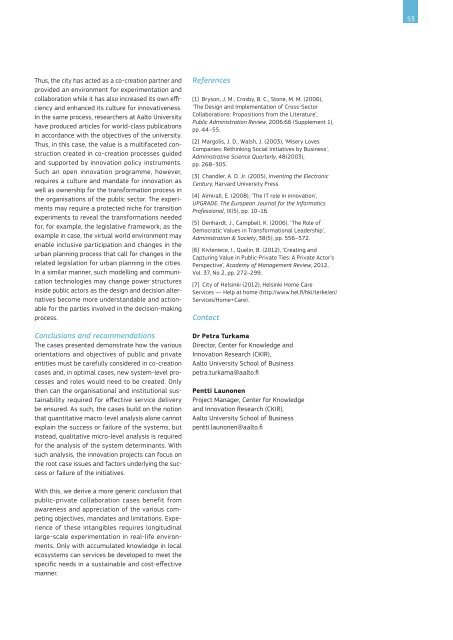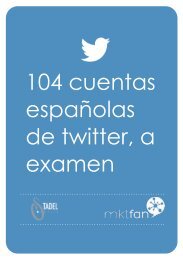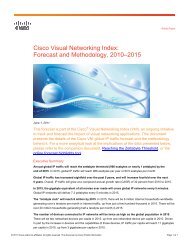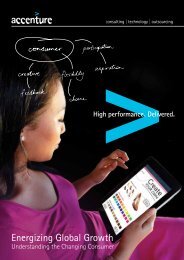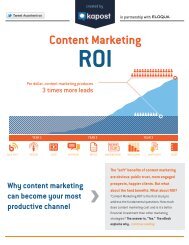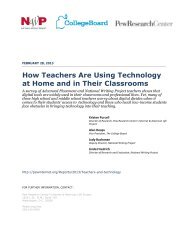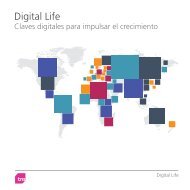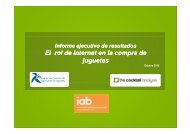Open Innovation 2.0 Yearbook 2013 - European Commission - Europa
Open Innovation 2.0 Yearbook 2013 - European Commission - Europa
Open Innovation 2.0 Yearbook 2013 - European Commission - Europa
You also want an ePaper? Increase the reach of your titles
YUMPU automatically turns print PDFs into web optimized ePapers that Google loves.
Thus, the city has acted as a co-creation partner and<br />
provided an environment for experimentation and<br />
collaboration while it has also increased its own efficiency<br />
and enhanced its culture for innovativeness.<br />
In the same process, researchers at Aalto University<br />
have produced articles for world-class publications<br />
in accordance with the objectives of the university.<br />
Thus, in this case, the value is a multifaceted construction<br />
created in co-creation processes guided<br />
and supported by innovation policy instruments.<br />
Such an open innovation programme, however,<br />
requires a culture and mandate for innovation as<br />
well as ownership for the transformation process in<br />
the organisations of the public sector. The experiments<br />
may require a protected niche for transition<br />
experiments to reveal the transformations needed<br />
for, for example, the legislative framework; as the<br />
example in case, the virtual world environment may<br />
enable inclusive participation and changes in the<br />
urban planning process that call for changes in the<br />
related legislation for urban planning in the cities.<br />
In a similar manner, such modelling and communication<br />
technologies may change power structures<br />
inside public actors as the design and decision alternatives<br />
become more understandable and actionable<br />
for the parties involved in the decision-making<br />
process.<br />
Conclusions and recommendations<br />
The cases presented demonstrate how the various<br />
orientations and objectives of public and private<br />
entities must be carefully considered in co-creation<br />
cases and, in optimal cases, new system-level processes<br />
and roles would need to be created. Only<br />
then can the organisational and institutional sustainability<br />
required for effective service delivery<br />
be ensured. As such, the cases build on the notion<br />
that quantitative macro-level analysis alone cannot<br />
explain the success or failure of the systems, but<br />
instead, qualitative micro-level analysis is required<br />
for the analysis of the system determinants. With<br />
such analysis, the innovation projects can focus on<br />
the root case issues and factors underlying the success<br />
or failure of the initiatives.<br />
With this, we derive a more generic conclusion that<br />
public–private collaboration cases benefit from<br />
awareness and appreciation of the various competing<br />
objectives, mandates and limitations. Experience<br />
of these intangibles requires longitudinal<br />
large-scale experimentation in real-life environments.<br />
Only with accumulated knowledge in local<br />
ecosystems can services be developed to meet the<br />
specific needs in a sustainable and cost-effective<br />
manner.<br />
References<br />
[1] Bryson, J. M., Crosby, B. C., Stone, M. M. (2006),<br />
‘The Design and Implementation of Cross-Sector<br />
Collaborations: Propositions from the Literature’,<br />
Public Administration Review, 2006:66 (Supplement 1),<br />
pp. 44–55.<br />
[2] Margolis, J. D., Walsh, J. (2003), ‘Misery Loves<br />
Companies: Rethinking Social Initiatives by Business’,<br />
Administrative Science Quarterly, 48(2003),<br />
pp. 268–305.<br />
[3] Chandler, A. D. Jr. (2005), Inventing the Electronic<br />
Century, Harvard University Press.<br />
[4] Almirall, E. (2008), ‘The IT role in innovation’,<br />
UPGRADE: The <strong>European</strong> Journal for the Informatics<br />
Professional, IX(5), pp. 10–16.<br />
[5] Denhardt, J., Campbell, K. (2006), ‘The Role of<br />
Democratic Values in Transformational Leadership’,<br />
Administration & Society, 38(5), pp. 556–572.<br />
[6] Kivleniece, I., Quelin, B. (2012), ‘Creating and<br />
Capturing Value in Public-Private Ties: A Private Actor’s<br />
Perspective’, Academy of Management Review, 2012,<br />
Vol. 37, No 2, pp. 272–299.<br />
[7] City of Helsinki (2012), Helsinki Home Care<br />
Services — Help at home (http://www.hel.fi/hki/terke/en/<br />
Services/Home+Care).<br />
Contact<br />
Dr Petra Turkama<br />
Director, Center for Knowledge and<br />
<strong>Innovation</strong> Research (CKIR),<br />
Aalto University School of Business<br />
petra.turkama@aalto.fi<br />
Pentti Launonen<br />
Project Manager, Center for Knowledge<br />
and <strong>Innovation</strong> Research (CKIR),<br />
Aalto University School of Business<br />
pentti.launonen@aalto.fi<br />
53


